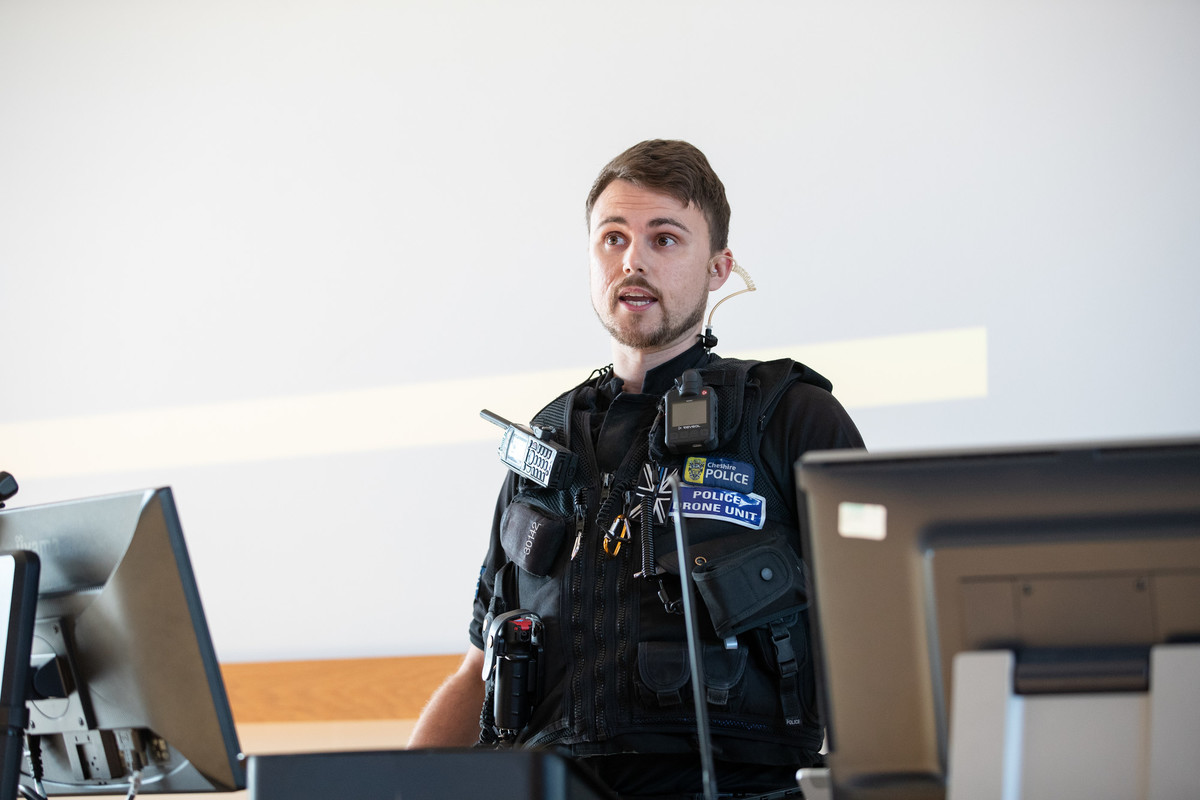Policing, Law and Investigation BSc (Hons) (Top-Up)


You are viewing Course summary
Course Summary
This course serves as a top-up qualification to a BSc Policing, Law, and Investigation honours degree. Students can apply if they have completed either Level 4 and 5 studies, a foundation degree, a Higher National Diploma (HND), or a similar qualification around public services. This is a valuable qualification that provides many transferable skills to assist future employment.
The course is delivered by ex-police officers and by those who have an academic background in criminology who have a wealth of policing knowledge. This expert insight enables students to learn the practical side of policing and investigation, as well as the academic, political, and economic aspects behind multi-agency investigations.
The subjects covered in this course are extremely topical and relevant to modern society, they provide an exciting insight as to how investigations are conducted and into what crime impacts society most.
Within the course, students will study five core modules, one being a research module where the student selects a topic to research. Other modules include the personal and societal effects of drug and alcohol abuse, terrorism and organised crime, protection of vulnerable persons and digital crime investigation.
These exciting subjects will provide students with an in-depth insight into crime and modern policing and multi-agency investigation. Students will also gain a host of transferable skills including communication, problem solving and leadership skills.
As a university, we not only want our students to gain a qualification and assist their future employment, but we also provide supportive pastoral care. Students will be allocated a Personal Academic Tutor (PAT) who will work with them throughout their studies to assist with any issues in the course of their learning.
Check out our course booklet and flyer for more information about the programme.
What you'llStudy
During the BSc Top-Up year, you will extend your skills and understanding of more specialist areas of policing and investigation. You will also have an opportunity to produce a dissertation, researching an area of policing that fascinates you.
Module content:
This module requires students engagement with the following:
To choose a specific and relevant topic/issue, and to develop and submit an 'ethical approval application' using the Institute of Policing's ethical approval documentation to gain ethical approval by the Institute of Policing's Ethics Committee in keeping within the University guidelines for dissertations taking particular note of the following when selecting the area for study;
- Academic viability;
- The study and preparation time involved;
- The adequacy and availability of suitable and relevant material; and
- The appropriateness of the particular topic chosen to undergraduate level study of Policing
The student will then undertake research and assessment on the approved topic by conducting a literature review, collecting, examining and evaluating data from primary and/or secondary sources. Using appropriate methodologies and design, data collection and data analysis strategy whilst considering Research Ethics and report the findings of their study.
Module aims:
This module provides an opportunity for students to carry out an in-depth study of a topic or issue based in, or closely allied to Policing by independent study.
The student will be introduced to the role of research in Policing and examine some of the main theories and methodologies used in social science and develop an understanding of the application of theory and methodology to research practice
The student will be introduced to aspects of the research process, including design, data collection, data analysis and the presentation of research findings
This will allow for students to develop their ability to understand and define clearly a problem or area for further study; develop the ability to extract relevant material from an in depth literature review using primary and secondary sources and to design and undertake an original investigation using ethically acceptable and appropriate research methodologies.
The student will develop the ability to present, critically analyse and interpret results, to present a coherent and critical account of the work developing time management skills and achieving a measure of independence.
Module content:
Child Safeguarding:
Working Together 2018
Common Assessment Framework/ Continuum of need
Police Powers to Safeguard
Assessment of Risks
Multi-Agency Process in Safeguarding
Domestic Abuse
Decision Making/Actions (Self Defence/Injury/History/Assessment)
DASH Risk Assessment Tool
Assessment of Risks
Threat to Life – Assessment
Honour Based Abuse
Risk Management – RARA – Dynamic/Static Risk Factors
Specialist Domestic Violence Courts, IDVA – Independent Domestic Violence Advocate
MARAC
MAPPA – Management of Sexual and Violent Offenders:
Core Function – Public Authorities
Multi-Agency Working Risk Management
Adult at Risk:
Definition - Multi-Agency Working
Safeguarding measures
Hate Crime
Missing Persons and Child Sexual Exploitation
Assessment of Risk
Role of the Police
Children Missing from Care
Child Sexual Exploitation
Module aims:
The aim of this module is to acquaint students with knowledge and understanding of the key issues and debates with regards to Multi-agency working in the context of protecting vulnerable children and adults who become or are at risk of being victims of crime. During this module key guidance and preventive models will be discussed which will lead to the recognition of what are the key issues that prevent effective multi-agency working and their impact on service delivery. This module will focus on all aspects of public protection in terms of how police manage criminal investigations and reduce the risks to the individual. Focus within this module will be towards the prevention of risk towards the victim and how offenders are managed identifying key issues that students will need to analyse and evaluate in terms of multi-agency working. In addition the module will outline key processes in criminal justice, including risk assessment and the planning and delivery of interventions to tackle dangerous offending. To critically review the term ‘safeguarding’ and how interventions can be put in place to reduce the risk to individuals and protect the public.
Module content:
In indicative study content for this module is:
- The typology of Terrorism, its actors, causes and objectives – A review of the historical, contemporary, and emerging terrorism landscape.
(Pre and post 9/11) - The threat and responses to extremist radicalisation in society, education, and prisons.
- The evolution of Domestic extremism ideology and approaches (Right & Left Wing, Environmentalists, Animal Rights, Single issue groups).
- The emergence of Serious and Organised transnational crime as a social problem, an examination of its history and scale
- The typology of Serious and Organised transnational crime, its actors, causes and objectives
- High policing response to national and transnational counter terrorism and organised crime. An examination of the key roles and responsibilities of responsible institutions and influential policy and politics (Security Service, Secret Intelligence Service, NCA, GCHQ, JTAC, UKBA, CTU, CTB’s and European partner agencies, Interpol, Europol, Eurojust).
- The development of national and international Counter Terrorism and Organised Crime legislation.
- The UK National Counter Terrorism Strategy: Contest and an examination of how the four pillars Pursue, Prevent, Prepare and Protect are applied to address the challenges of 21st century threat and risk.
- Local, National and Transnational intelligence sharing and offender management across permeable and open borders.
- The supranationalisation of EU internal and external relations in counter terrorism and organise crime policy.
- Neighbourhood policing challenges and approaches to community engagement, reassurance and interpretation and application of threat analysis.
Module aims:
The aim of this module is for the student to consider the chronological development and theoretical perspectives of the nature and threat from domestic extremism, domestic and transnational terrorism and organised crime as they apply to 21st century society.
The student will consider a range diverse contexts that have/continue to influence actor involvement in criminal activity as well as examining the methodology employed by extremist actors in carrying out criminal activities. The student will also examine in detail the national and transnational responses to the threat and acts of terrorism, organised crime and associated criminal/extremist activity, with particular emphasis on post 9/11 developments.
Specific emphasis will focus on the key pillars of the United Kingdom Counter Terrorism Strategy and Organised Crime Strategy how they apply to contemporary policing philosophy and practical application of investigative practices.
Module content:
In this module the student will study:
Alcohol:
- The issues of alcohol in society, the impact on crime and disorder
- Government and ACPO National Alcohol Strategy
- Local multi-agency partnership working initiatives to address alcohol abuse
- Partnership Working and Pub Watch Schemes
- Policing the Licensing
- Alcohol and offences connected with alcohol and children
Drugs:
- Drug myths, the social construction of drugs as a ‘social problem’
- History: drugs and drugs policy in Britain
- Drugs and the impact on crime and disorder
- Drugs and policing
- Drug supply and distribution
- Drugs in childhood
Module aims:
This module aims to develop a multi-perspective of understanding how drugs and alcohol impact upon society in the UK and elsewhere by enabling students to apply sociological, historical, psychological and cultural perspectives to the study of drug and alcohol use, and policy responses to this ‘social problem’. The student will be provided with an in depth critical understanding regarding why people abuse drugs and alcohol and how this abuse is understood within societies, and how societies respond.
Module content:
During this module the student will study:
- The four key types of digital crime, namely those crimes classed as crimes which have a ‘digital footprint’, ‘internet facilitated crime’; ‘Cyber enabled crime’ and ‘Cyber dependent crime’
- Regulatory control, the Regulation of Investigatory Powers Act 2000, Computer Misuse Act 1990, Data Protection Act 1998 and the NPCC (ACPO) Guidance for Digital Evidence
- Computer Forensics Principles, the role of the Computer Forensic examiner and analyst and developing computer forensic technologies
- The development of the World Wide Web, the “Dark Web” and the “Internet of Things”, the challenges and opportunities this presents to law enforcement
- How networks are configured and can be attacked and exploited
- Encryption and Steganography, its use and the challenges it presents
- Email processes and the securing of email evidence
- The Cyber Criminal Mind-set and methods of cyber-attack
- Internet Investigation, best practice and tactics.
Module aims:
This module explores the history, realities and investigative opportunities of digital crime including the key principles of computer forensics and network investigations. Students will develop an understanding of how a computer works and how networks are configured within the context of digital crime investigations. It will critically examine, for example, the question of whether widespread practices should be treated as computer crime or computer misuse and the current encryption security v privacy debate. Students will acquire a comprehensive understanding of the legislation and case law which strives to keep pace with a rapidly evolving medium. It will consider in depth, the nature and differing forms of digital crime and will examine the impact of each from the local neighbourhood level to the impact nationally on the UK’s security and finances. Students will gain an understanding of the motivations and modus operandi of the Cyber Criminal and the preventative methods that can be employed to thwart cyber-attacks.
You will be taught by experienced practitioners (retired police officers) who have a diverse range of knowledge and skills, together with subject specialists from law enforcement agencies.
Teaching methods comprise lectures, field trips, subject specialist speakers, in-class tests, self-directed study, online resources, and the use of immersive learning in our Hydra facility. Use of the immersive learning suite is essential to consolidate the learning process by enabling you to apply knowledge attained from your classroom learning to life-like scenarios.
Methods of assessment are varied and stimulating and are explicitly linked to each module learning outcome. Examples of summative methods of assessment include case studies, personal and group presentations, role-play activities, recorded interviews and assignments.
Entry Requirements
|
Extra Information / General Entry Requirements |
Applicants must have successfully completed the University of Chester's FdSc Policing, Law and Investigation programme, a Foundation Degree in Policing or another related programme. An interview will form part of the process. |
Students from countries outside the UK are expected to have entry qualifications roughly equivalent to UK A Level for undergraduate study and British Bachelor's degree (or equivalent) for postgraduate study. To help you to interpret these equivalents, please click on your country of residence to see the corresponding entry qualifications, along with information about your local representatives, events, information and contacts.
We accept a wide range of qualifications and consider all applications individually on merit. We may also consider appropriate work experience.
English Language Requirements
- IELTS Academic: Undergraduate: 6.0 (minimum 5.5 in each band)
- Postgraduate: 6.5 (minimum 5.5 in each band)
For more information on our English Language requirements, please visit International Entry requirements.
Fees and Funding
£9,250 per year (2024/25)
Our full-time undergraduate tuition fees for Home students entering University in 2024/25 are £9,250 a year, or £1,540 per 20-credit module for part-time study.
The University may increase these fees at the start of each subsequent year of your course in line with inflation at that time, as measured by the Retail Price Index. These fee levels and increases are subject to any necessary government, and other regulatory, approvals.
Students from the UK, Isle of Man, Guernsey, Jersey and the Republic of Ireland are treated as Home students for tuition fee purposes.
Students from countries in the European Economic Area and the EU starting in or after the 2021/22 academic year will pay International Tuition Fees.
Students who have been granted Settled Status may be eligible for Home Fee Status and if eligible will be able to apply for Tuition Fee Loans and Maintenance Loans.
Students who have been granted Pre-settled Status may be eligible for Home Fee Status and if eligible will be able to apply for Tuition Fee Loans.
Irish Nationals living in the UK or Republic of Ireland are treated as Home students for Tuition Fee Purposes.
£13,950 per year (2024/25)
The tuition fees for international students studying Undergraduate programmes in 2024/25 are £13,950.
This fee is set for each year of study. All undergraduate students are eligible for international and merit-based scholarships which are applicable to each year of study.
For more information, go to our International Fees, Scholarship and Finance section.
Irish Nationals living in the UK or ROI are treated as Home students for Tuition Fee Purposes.
Your course will involve additional costs not covered by your tuition fees. This may include books, printing, photocopying, educational stationery and related materials, specialist clothing, travel to placements, optional field trips and software. Compulsory field trips are covered by your tuition fees.
If you are living away from home during your time at university, you will need to cover costs such as accommodation, food, travel and bills.
The University of Chester supports fair access for students who may need additional support through a range of bursaries and scholarships.
Full details, as well as terms and conditions for all bursaries and scholarships can be found on the Fees & Finance section of our website.
Your Future Career
Job prosects
Successful completion of this degree will provide the opportunity to gain employment in either policing or a wider law enforcement capacity.
Careers service
The University has an award-winning Careers and Employability service which provides a variety of employability-enhancing experiences; through the curriculum, through employer contact, tailored group sessions, individual information, advice and guidance.
Careers and Employability aims to deliver a service which is inclusive, impartial, welcoming, informed and tailored to your personal goals and aspirations, to enable you to develop as an individual and contribute to the business and community in which you will live and work.
We are here to help you plan your future, make the most of your time at University and to enhance your employability. We provide access to part-time jobs, extra-curricular employability-enhancing workshops and offer practical one-to-one help with career planning, including help with CVs, applications and mock interviews. We also deliver group sessions on career planning within each course and we have a wide range of extensive information covering graduate jobs and postgraduate study.









